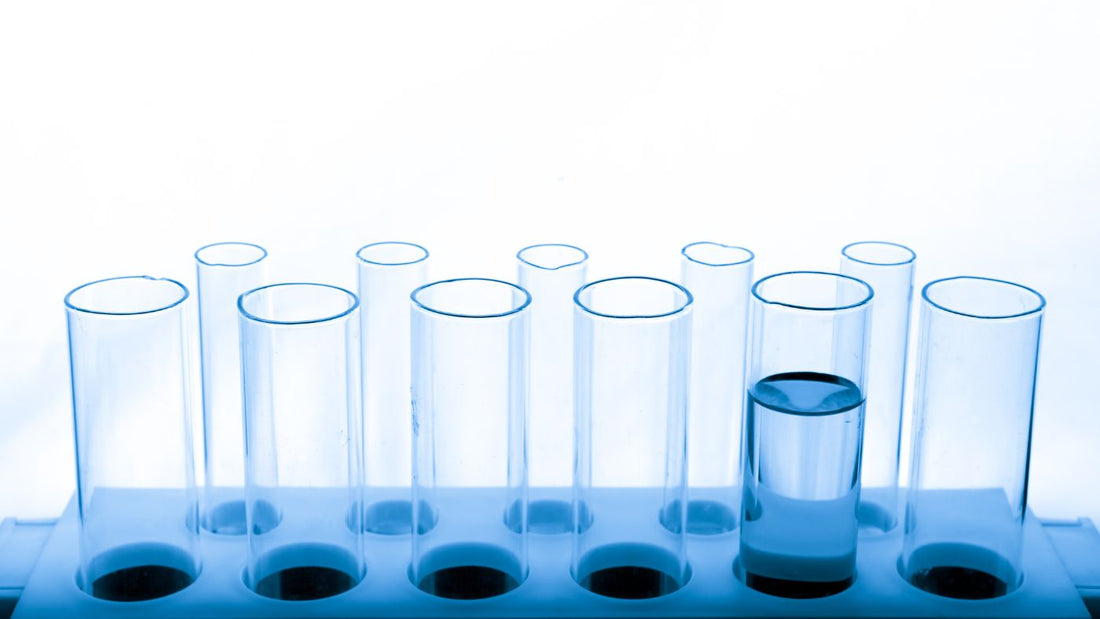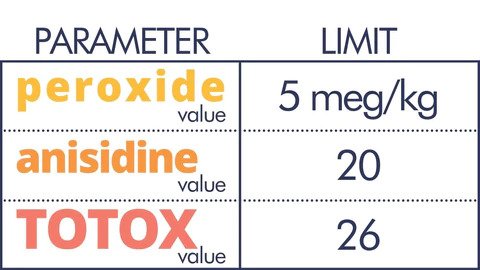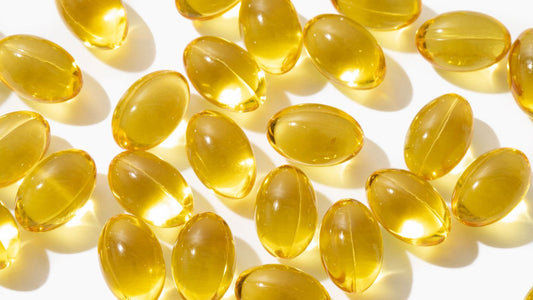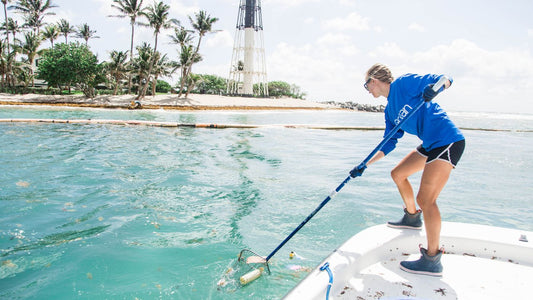Why Oxidation Levels Matter in Fish Oil Supplements
TL;DR

If you take a fish oil supplement, you might've noticed that the capsules can start to seem like they are losing their freshness over a relatively short time. Unfortunately, that probably means it was not so fresh when you bought it, even if it came sealed from the manufacturer!
When we use the term "fresh," it's not a marketing ploy. In this case, we're talking about oxidation (or lack thereof). And once oxidation sets in, there's no going back for that fish oil. You can flush it down the toilet, where icky things belong.
What's oxidation, you ask?
Thankfully, this topic has been shoved into the spotlight for the general public in recent years (1, 2), but the science of it is still elusive for some.
When oxygen combines with a single element or larger compound, an oxidation reaction occurs on the molecular level. As a result, the atom or molecule in question begins to lose electrons and break down. Of course, this type of chemical reaction isn't always bad. However, when it comes to nutrition - particularly in food and supplements - the deterioration in nutritional quality and natural byproducts produced by oxidation pose some serious issues.
Fish oil is abundant in EPA and DHA omega-3, polyunsaturated fats. These polyunsaturated fats have multiple double bonds between their carbon atoms, making them impressively flexible and responsive in your cells. The drawback is that this hyper-flexibility makes them more prone to oxidation. As fish oil oxidizes, new and harmful byproducts begin to form (lipid peroxides, aldehydes, and ketones, to name a few) (3).
Since fish oils are particularly vulnerable to oxidative degradation, we want to empower you to be picky about the omega-3 supplements you choose!
Heaven knows we are. And for good reason(s).
We formulated, sourced, and produced FullWell Fish Oil to give you an omega-3 supplement with the ideal ratio of EPA and DHA for fertility and to ensure you weren't wasting money on supplements that go bad one week after you buy them. After all, oxidated fish oil supplements are not just a drain on your wallet: they can potentially cause damage to brain cells, spark inflammation, and increase the risk of diabetes and cardiovascular diseases. For example, one recent study showed that women who took an extremely-oxidized oil consistently for a month saw much higher cholesterol levels than those who took a fresh, unoxidized supplement (4). Additionally, animal studies have demonstrated the impact of rancid fish oil on both mothers and newborns, finding that oxidized fish oil increased maternal insulin resistance and newborn mortality rates (5).
So skipping a fish oil supplement altogether is a much safer option than taking oxidized, over-the-hill products. But that doesn’t mean it is wise to under consume essential omega-3 fatty acids! Our goal is to guide you to safe choices.
After launching FullWell Fish Oil, we realized that other brands (perhaps strategically) gloss over oxidation. As a result, one of our most commonly asked questions across the board pertains to freshness and shelf life, which matters most here.
Why don't consumers know much about oxidation?
Frankly, the supplement industry is shockingly underregulated when it comes to oxidation. FullWell, of course, abides by our own strict, incredibly high standards, but for other brands, the steps in processing are not all that specific. In addition, the sourcing and manufacturing of many other oils are all allowed to happen away from the public, ultimately shielding disconcerting facts and practices from consumers (6). (Unfortunately, not all brands are like us and don’t live by the concept of transparency, COAs, and third-party testing.)
Even for the savviest consumers, there is limited opportunity to trace the source, the age, and processing practices of a fish oil just by going off of the final packaged product. The end of this lax process results in consumers purchasing oxidized fish oils with no evidence of the product's source, age, and oxidation levels.
So why does fish oil go bad so quickly?
The most common catalysts that accelerate oxidation are exposure to (7):
Air
Light
Heat
Water
Heavy metals and other contaminants like PCBs and Dioxins
Any of these factors can degrade the freshness of your fish oil. That’s why sourcing, production, delivery method, and third-party testing are so essential in fish oil supplements.
AIR
As with food, the moment you open your supplements, the clock on its shelf life starts ticking, so minimize oxygen exposure and keep the cap on tight when not in use. You'll want to take your supplement regularly not only to achieve the desired effects but to ensure you optimize it as the capsules become exposed.
LIGHT
Similarly, light can cause things to start to break down, which is why we utilize packaging that completely blocks light altogether. We suggest avoiding any supplements that come in clear containers, but if you already have any, store those in a cabinet or drawer that doesn't receive any sunlight. Go one step further next time by choosing a supplement that comes in a solid bottle, and avoid combining your fish oil (or any of your FullWell supplements for that matter) in a pill sorter.
HEAT
We know that heat sends atoms into motion, and as such, it also kickstarts oxidation. So, if your supplements are shipped, be prepared to bring them indoors as soon as possible and no more than twenty-four hours after they are delivered. Once inside, store them in a cool, dry place that doesn't dramatically fluctuate in temperature. For example, you don’t need to store your fish oil in the refrigerator… but that doesn’t mean you can keep it in the glove compartment of your car, either!
WATER
Once your supplements get wet, there is no turning back. Think of moisture as the beginning of the digestion process. A capsule hits your tongue, and after you swallow, it breaks down in your digestive tract to get to work. Likewise, when a liquid touches your supplements outside your mouth, it releases oxygen upon hydration, causing it to spoil faster. So, store your supplements in a dry place and keep bottles tightly sealed. Avoid using wet hands to dispense your supplements from their bottle because this can lead to moisture seeping in and wreaking havoc.
HEAVY METALS + PCBs + DIOXINS
Here is where sourcing and third-party testing matter most. We intentionally source FullWell Fish Oil from sustainably sourced, wild-caught fish. Many brands skip testing for PCBs and dioxins altogether, which is why we are so vocal and transparent about these components. If you’re ever interested in seeing our COAs for your batch, reach out to cs@fullwellfertility.com. We provide these readily and happily!
How is oxidation measured?
Three primary measures test for oxidation in omega-3s:
Peroxide Value (PV)
Anisidine Value (AV)
TOTOX Value
The peroxide value (PV) provides a quantitative measure of hydroperoxide levels. PV is a measure of how much peroxide is present in an oil. When unsaturated fatty acids oxidize, the first compounds created are fatty acid peroxides. Therefore, PV is a measure of primary oxidation and evaluates the status of various oils, not just omega-3s. However, while the PV initially increases as oil oxidizes, it can decrease as the peroxides react in further oxidative reactions. As a result of that peroxide consumption, a low PV is not necessarily an indicator of high-quality oils on its own. Hence, measures of secondary oxidation are necessary to determine freshness.
Secondary oxidation reveals itself through the anisidine value (AV). AV communicates a measurement of aldehydic compounds. Secondary oxidation products are the products formed from the initially formed peroxides during further steps in the oxidative process and include chain-shortened aldehydes and alcohols.
Finally, we combine these values to assess the degree of oxidation, reflected as the TOTOX value. Consider the TOTOX as a way to triple-check the results, expressing oxidation in a calculation that combines PV and pAV. This parameter gives a complete picture of oxidation by including primary and secondary oxidation measurements. TOTOX is widely employed to express the oxidative quality of omega-3 oils across the entire industry, and clear upper limits have been set for each of these values to protect consumers.
Since these are the numerical caps, when it comes to oxidation testing values, the lower, the better. According to the Global Organization for Omega-3, an unsafe peroxide value starts at 5.0 milliequivalent/kg. A large number of brands have PVs of 8.0 or more, but FullWell’s Fish Oil holds a low peroxide value of just 2.
A similarly impressive number pops up for our overall TOTOX score. Our first production run yielded a product scoring 11.2, far under the TOTOX limit. Our phenomenal TOTOX score is why we test oxidation levels. We also are happy to provide values with the bottling date upon request. Again, transparency is one of our core beliefs.






